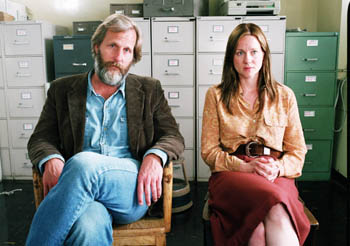![[Metroactive Movies]](/movies/gifs/movies468.gif)
[ Movies Index | Show Times | Silicon Valley | Metroactive Home | Archives ]
File Cabinets of Curiosity: Jeff Daniels and Laura Linney play a pair of literary neurotics in 'The Squid and the Whale.'
See Monsters
Noah Baumbach's 'The Squid and the Whale' plumbs the depths of divorce with a razor wit
By Richard von Busack
THE GHOST OF Jean Eustache is haunting our cinema. "A [To] Jean Eustache," reads the dedication for Jim Jarmusch's Broken Flowers. In the scintillating The Squid and the Whale, director Noah Baumbach displays a poster for Eustache's 1972 The Mother and the Whore. "That's a classic," says a too-wise lit student, Lili (Anna Paquin).
The times are right for a revival of The Mother and the Whore, a pressure-cooked chamber piece about a blood-curdling Parisian love triangle. Jarmusch's debt to the French filmmaker isn't obvious, although The Mother and the Whore's peacocky lover boy Alexandre (Jean-Pierre Léaud) might have grown into Bill Murray's numbster Don Johnston.
But The Squid and the Whale merits its citation of Eustache, in the harsh light it sheds on a male-female struggle. The title image of fighting sea monsters is illustrated by a diorama in New York's Museum of Natural History. As in The Mother and the Whore, proudly civilized intellectuals are in terrible combat beneath a calm aquatic surface.
One of the locales for this 1986-set comedy-drama is a plastic-roofed tennis-club tent called "the bubble," where the kids learn from a dumbbell tennis instructor (William Baldwin). The Berkman family inhabits its own bubble. The demands on the children never let up, as the parents devise a hair-brained joint-custody scheme, which keeps the two boys shuttling back and forth on the subway. This is one of the few New York movies with no towers or river views, except at the end, when Baumbach caps a movie full of French New Wave�style, shardlike jump cuts with a riverside tribute to J.-P. Léaud's race to the beach in The 400 Blows.
The family members are frayed even before they split up. Teacher/novelist father Bernard (Jeff Daniels) has a badger beard and corduroy coat and the gravitas that conceals a mailbox full of rejection slips. Bernard displays as much nurturing instinct as a tomcat. He is a tightwad and a blowhard, like his idol Norman Mailer. He even autographs a book to his son Walt (Jesse Eisenberg) with the phrase "Best Wishes."
Bernard recites his grievances against women, which are picked up as gospel by the confused adolescent. By contrast, Joan (Laura Linney) is using her just-pubescent younger son, Frank (Owen Kline), as a sounding board for her own sexual adventures.
The father is quick to remind Walt that both his parents have Ph.D.s in literature. While the kids practically stumble over the literary names dropped in their living room, the parents have not been sensitized or humanized by their writing. The Squid and the Whale might as well be about the children of ambitious cobblers. What's important to both parents is a constant ranking and reranking; they're courtiers in the court of The New Yorker.
This is an angry-kid's view, preserved over the decades. Ordinarily, I dread divorce movies told from the children's perspective. Never is there a sense of what divorce so often is, a coup de grâce for a marriage that wants to die. The film defies the tear-stained subject matter; it's the opposite of the sugar-frosted sadness of the Baumbach-co-scripted The Life Aquatic With Steve Zissou.
Here, Baumbach brings merciless shrewdness to bear on the autobiographical figure. As played by Eisenberg, Walt's posture seems bent under the weight of his parents' genius. He is most lovable when he shows his childish weakness; that quality is reflected in the shoegazing song he plagiarizes from Roger Waters; it's heard in the Bert Jansch folk-music laments on the soundtrack.
Walt's vulnerability is visible in the clumsy dealings with the girl who likes him (Halley Feiffer). We sense it in his prissy moan when he finds out his mother had a lover: "Oh God, under our nose, like a bordello, men coming in and out!"
And the kids' bad behavior in the power vacuum is all their own. Frank starts drinking stolen booze and vandalizing his school with globs of his own semen. Under the burden of the worthless advice on women from his dad, Walt develops a crush on the rootless student Lili, whom his dad has invited to live with them.
The missing side of this portrait is what's overt in The Mother and the Whore, when Alexandre eulogizes the dashed hopes of May 1968. It's strange that we don't see how political impotence helped make such incredible narcissists out of the adults. Where's all the griping about Reagan that would have gone on in a household like the Berkmans?
Otherwise, The Squid and the Whale is a masterstroke of sardonic writing and acting. Daniels has never been better in his career-long exploration of weakling men. Also, Linney's auburn-haired sleekness has never seemed more scary, either, as she uses pet names to try to reach out to her neglected, spurned children: "Pickle" for Frank and "Chicken" for Walt, as if the younger son was as insignificant as a pickle, or the elder was as inconsequential as a chicken.
Each new revelation of coldness brings down the film's temperature, and sharpens its lucidity. The odd title metaphor is perfect when we see the cephalapodic calm of the mother or the stolid, whalelike certainty of the father.
[ Silicon Valley | Metroactive Home | Archives ]
![]()

Photograph by James Hamilton
The Squid and the Whale (R; 80 min.), directed and written by Noah Baumbach, photographed by Robert D. Yeoman and starring Jeff Daniels and Laura Linney, opens Friday at selected theaters.
Send a letter to the editor about this story to letters@metronews.com.
From the October 26-November 1, 2005 issue of Metro, Silicon Valley's Weekly Newspaper.